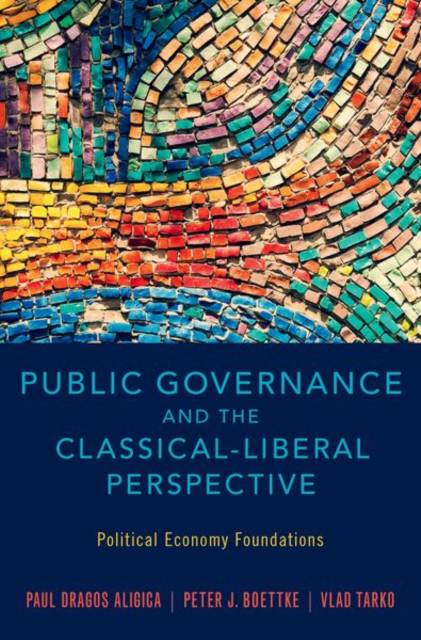
- Afhalen na 1 uur in een winkel met voorraad
- Gratis thuislevering in België vanaf € 30
- Ruim aanbod met 7 miljoen producten
- Afhalen na 1 uur in een winkel met voorraad
- Gratis thuislevering in België vanaf € 30
- Ruim aanbod met 7 miljoen producten
Zoeken
Public Governance and the Classical-Liberal Perspective
Political Economy Foundations
Paul Dragos Aligica, Peter J Boettke, Vlad Tarko
Hardcover | Engels
€ 159,95
+ 319 punten
Omschrijving
Classical liberalism entails not only a theory about the scope of government and its relationship with the market but also a distinct view about how government should operate within its proper domain of public choices in non-market settings. Building on the political economy principles underpinning the works of diverse authors such as Friedrich Hayek, James Buchanan and Vincent and Elinor Ostrom, this book challenges the technocratic-epistocratic perspective in which social goals are defined by an aggregated social function and experts simply provide the means to attain them. The authors argue that individualism, freedom of choice, and freedom of association have deep implications on how we design, manage and assess our public governance arrangements.
The book examines the knowledge and incentive problems associated with bureaucratic public administration while contrasting it with democratic governance. Aligica, Boettke, and Tarko argue that the focus should be on the diversity of opinions in any society regarding "what should be done" and on the design of democratic and polycentric institutions capable of limiting social conflicts and satisfying the preferences of as many people as possible. They thus fill a large gap in the literature, the public discourse, and the ways decision makers understand the nature and administration of the public sector.
The book examines the knowledge and incentive problems associated with bureaucratic public administration while contrasting it with democratic governance. Aligica, Boettke, and Tarko argue that the focus should be on the diversity of opinions in any society regarding "what should be done" and on the design of democratic and polycentric institutions capable of limiting social conflicts and satisfying the preferences of as many people as possible. They thus fill a large gap in the literature, the public discourse, and the ways decision makers understand the nature and administration of the public sector.
Specificaties
Betrokkenen
- Auteur(s):
- Uitgeverij:
Inhoud
- Aantal bladzijden:
- 280
- Taal:
- Engels
Eigenschappen
- Productcode (EAN):
- 9780190267032
- Verschijningsdatum:
- 3/06/2019
- Uitvoering:
- Hardcover
- Formaat:
- Genaaid
- Afmetingen:
- 157 mm x 236 mm
- Gewicht:
- 566 g

Alleen bij Standaard Boekhandel
+ 319 punten op je klantenkaart van Standaard Boekhandel
Beoordelingen
We publiceren alleen reviews die voldoen aan de voorwaarden voor reviews. Bekijk onze voorwaarden voor reviews.











